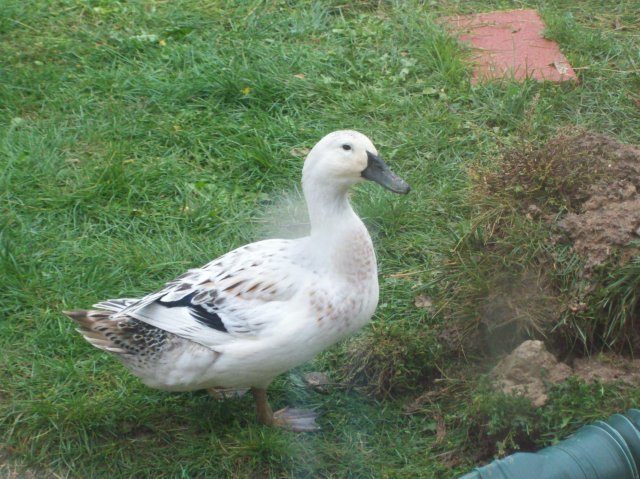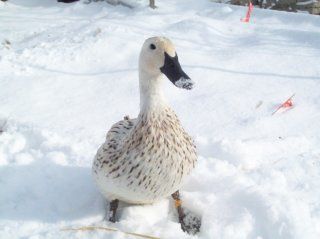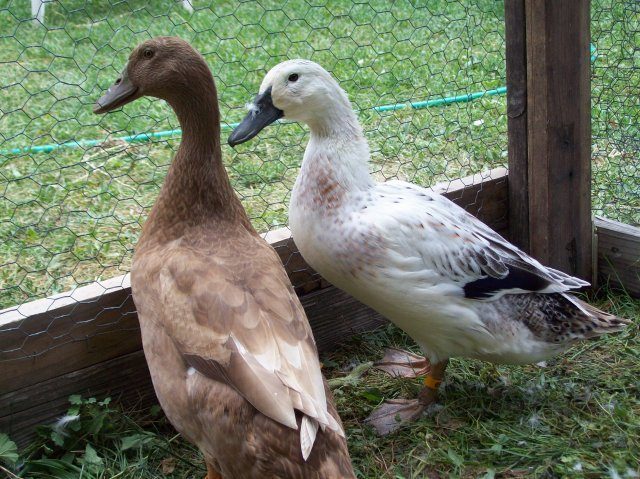Thank you, that's what I thought and that's what I told them. They then went so far as to imply that because mine don't hatch on day 23 that they much be mixed breeds or have gotten a breed mixed in somewhere down the line.
Navigation
Install the app
How to install the app on iOS
Follow along with the video below to see how to install our site as a web app on your home screen.
Note: This feature may not be available in some browsers.
More options
You are using an out of date browser. It may not display this or other websites correctly.
You should upgrade or use an alternative browser.
You should upgrade or use an alternative browser.
Welsh Harlequin
- Thread starter beakkeeper
- Start date
Duckworth
Songster
My Welsh are about 3-1/2 weeks old and they are huge--much bigger than my khakis were at this age last year. I intended to get all ducks. All had pink beaks at 1-2 days old and were a special order for females. But I'm starting to wonder about them. Time will tell.
How old do they tend to be before they start quacking instead of cheeping?
They are feathering now on breasts, wings, and upper backs. How soon can I move them outside? Our daytime temps were in the 80's and low 90's, but have dropped back into the 50's and 60's this week due to a string of rain storms. They are very messy in the brooder indoors and it's hard to keep it clean and relatively dry. Out of every gallon of water I put in the dispenser, at least 2/3 of it ends up in the pine shavings.
How old do they tend to be before they start quacking instead of cheeping?
They are feathering now on breasts, wings, and upper backs. How soon can I move them outside? Our daytime temps were in the 80's and low 90's, but have dropped back into the 50's and 60's this week due to a string of rain storms. They are very messy in the brooder indoors and it's hard to keep it clean and relatively dry. Out of every gallon of water I put in the dispenser, at least 2/3 of it ends up in the pine shavings.
They normally start quacking between 6-8 weeks.My Welsh are about 3-1/2 weeks old and they are huge--much bigger than my khakis were at this age last year. I intended to get all ducks. All had pink beaks at 1-2 days old and were a special order for females. But I'm starting to wonder about them. Time will tell.
How old do they tend to be before they start quacking instead of cheeping?
They are feathering now on breasts, wings, and upper backs. How soon can I move them outside? Our daytime temps were in the 80's and low 90's, but have dropped back into the 50's and 60's this week due to a string of rain storms. They are very messy in the brooder indoors and it's hard to keep it clean and relatively dry. Out of every gallon of water I put in the dispenser, at least 2/3 of it ends up in the pine shavings.
Are they still on heat? If so, it would be too much of a sudden change, and you'd have to gradually wean them off it. Also, how many ducklings do you have? If you have a larger group, than they might be able to keep themselves warm, but it also depends on how cold it gets at night.
One way to reduce water spillage, is to sit the drinker on top of a tray, which is covered in hardware cloth. This way, all of the water falls through into the tray and it can just be emptied out every day.
Opps double post...
Duckworth
Songster
There are four. They seemed too warm on heat when our temperatures went up into the upper 80's and low 90's F, and I'd been weaning them off. We don't have central air conditioning, so the room tends to be as warm as it is outside or heated, when it's cold enough for the radiators to go on.They normally start quacking between 6-8 weeks.
Are they still on heat? If so, it would be too much of a sudden change, and you'd have to gradually wean them off it. Also, how many ducklings do you have? If you have a larger group, than they might be able to keep themselves warm, but it also depends on how cold it gets at night.
One way to reduce water spillage, is to sit the drinker on top of a tray, which is covered in hardware cloth. This way, all of the water falls through into the tray and it can just be emptied out every day.
I put the ducklings in the bathtub for a swim every other day at least, in lukewarm water, then put the heat back on until they are thoroughly dry. Then, depending on the room temperature, I move them farther from the heat or turn it off. The swim time gives me a chance to clean every part of their pen and gear. Between swims, I add Pine shavings to keep things dry and cover poop. I'm going to try the tray under the water. The ducklings go through about five gallons of water a day and about five cups of unmedicated chick starter.
Duckworth
Songster
Our temperatures are only going to be in the 60's and 70's this week, so I don't think I will be able to move them outdoors. I will be building their duck house and a fully enclosed pen this week. It gets very cold here in the winter, with temperatures from -10 to 25F for two or three months. In summer, we get a lot of upper 90's days, so the ducks will need shade and lots of ventilation.They normally start quacking between 6-8 weeks.
Are they still on heat? If so, it would be too much of a sudden change, and you'd have to gradually wean them off it. Also, how many ducklings do you have? If you have a larger group, than they might be able to keep themselves warm, but it also depends on how cold it gets at night.
One way to reduce water spillage, is to sit the drinker on top of a tray, which is covered in hardware cloth. This way, all of the water falls through into the tray and it can just be emptied out every day.
The pen will have a solid roof to keep the rain and snow out and be enclosed on all six sides because we have raccoons, opossums, foxes, dogs, cats, and hawks. The ducks will be able to forage in the yard. We are on about a quarter acre, but the house takes up almost half of that. About two-thirds of it is fenced and a third of that is vegetable garden. How big should the duck house be? We won't be getting any additional ducks. How big for the pen? Our dogs are going to be predators to protect against, so I can only make the pen big enough that I can put an additional fence around it.
Thanks for giving me a chance to brag about my Bridgett! She is the apple of my eye! I have three hens and I love them all but Bridgett is not only the prettiest, the friendliest, the most curious, but also the best layer of all of them.Bridgett is of course a WH, my other two hens are a Runner and a Khaki Campbell. I was very suprised to realize a week or so ago that the one daily egg I have been getting since another one stopped laying in early December, has come from Bridgett and not my Campbell! She knows her name, and is the bravest of all the ducks when I am giving out food by hand. Her quack is quieter than the other ducks, but she does make the cutest squeaky toy sounds sometimes.
Here she is!



with her "sister" Yacky
Wow, I know you posted this some time ago, but the photo of the khaki and the welsh really struck me. I have 5 khaki, and am considering getting 3 more females this year. Are the Welshies as calm as they say they are?
I’m in northern Ohio, so winter gets fairly cold. How do the Welshies do in winter?
Egg production like khakis?
BTW, my beloved ducks are 100 percent pets.
dheltzel
Crowing
I'm sure they do at least as well as the Campbells, being slightly larger. Mine aren't very calm, but that might be more about how they were raised. They are excellent layers, I recommend them for laying ducks, and they are somewhat sexable at hatch by bill color, which is another advantage over the Campbells.Wow, I know you posted this some time ago, but the photo of the khaki and the welsh really struck me. I have 5 khaki, and am considering getting 3 more females this year. Are the Welshies as calm as they say they are?
I’m in northern Ohio, so winter gets fairly cold. How do the Welshies do in winter?
Egg production like khakis?
BTW, my beloved ducks are 100 percent pets.
Similar threads
- Replies
- 1
- Views
- 782
New posts New threads Active threads
-
Latest threads
-
-
-
-
-
Hen doing the wingdance to a cockerel
- Started by Altairsky
- Replies: 2
-
-
Threads with more replies in the last 15 days
-
-
Question of the Day - Friday, February 13th, 2026
- Started by casportpony
- Replies: 86
-
What am I doing wrong?? Egg Eaters
- Started by Leasmom1013
- Replies: 70
-
-
BYC's 52-Week Photography Challenge: Week 6 (Feb 9 - Feb 15, 2026) - Theme: Vehicles!
- Started by Evadig
- Replies: 56
-
×





